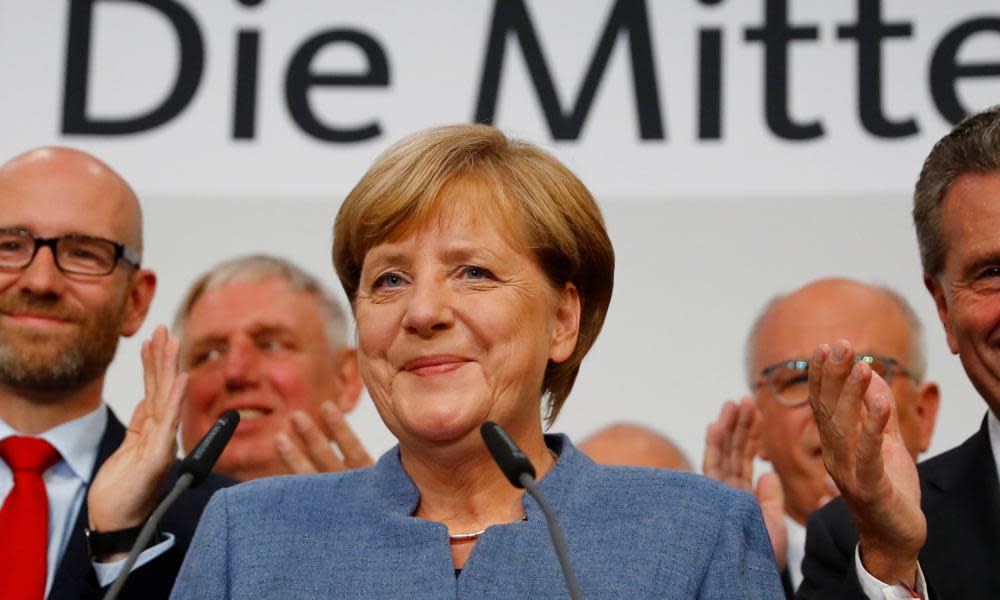Challenges Merkel faces as she starts fourth term as German chancellor

In what will be her fourth and likely final term in office as German chancellor, Angela Merkel is unlikely to get complacent about the tasks ahead. She has told confidantes she would like to step off the treadmill of power at a time of her choosing, but it would not be in her nature to leave mid-term – unless, she has herself said, her health became an issue.
Neither would it be characteristic of her to leave any major loose ends undone. But the challenges she faces are considerable and weighty. While Germany is enjoying something of a golden age in economic terms, there are plenty of signs of trouble ahead, from challenges in the ailing steel industry, which employs thousands of workers, to the diesel crisis and calls for the abolition of the combustion engine, which needs her leadership to ensure it doesn’t do lasting damage to the German car industry on which around 800,000 jobs are dependent. Merkel is also aware that Germany needs to make huge strides in improving its digitalisation performance, with many indications that it is lagging behind other international players.
The country’s economic robustness is also likely to be hit by a looming demographic crisis which over the next few years will see baby boomers go into retirement, and whilst the country’s chronically low birth rate has recovered somewhat in recent years, it has occurred far too late to manage the shortfall.
While the hundreds of thousands of refugees Germany has taken in are often viewed as being a partial solution to the demographic crisis, the challenges of integrating and assimilating them into German society and the workplace remain immense and will require more guidance and fine-tuning - both financial and legislative - from central government if Merkel does not want her legacy to be that her open door policy was her biggest failure.
She will have to address the pressing demands for reform of German immigration policy to ensure a more controlled flow of skilled and semi-skilled workers, as well as investing more in training and education at home, in recognition of the fact that it is very hard to get skilled workers to move to Germany.
A reform of the pensions system will also be imperative. Merkel’s recent insistence that she wants to stick to the rule of retirement at 63 is out of sync with many of her political allies and economic advisers, who have called it highly unrealistic.
Environmentally she faces a backlash over her support for lignite - a form of coal - and for the car industry despite its grave errors and the deeply corrupt behaviour it has displayed over diesel emissions. And she may well be forced to face the fact that her knee jerk reaction to Fukushima which led to her announcing Germany would abandon nuclear power, was overly hasty.
On defence, Merkel will be forced to address demands from Nato and the US that it doubles its defence budget, at the same time as appeasing the generally pacifist outlook of the German voter. But as the German military plays an increasingly important role in places like Africa and the Middle East, coupled with increased costs due to technological developments, she will have little choice but to fight for a bigger defence budget.
The crises in Ukraine, Turkey - with whom she has a delicate deal over refugees - and over North Korea will see her continued deep involvement in major foreign policy issues. Donald Trump’s isolationism, Russian belligerence and international terrorism will all keep her busy.
And with the EU increasingly being run through Berlin rather than Brussels, she will play a central role in the Brexit negotiations, with everything indicating that she will continue to take a tough line over anything that appears concessionary towards Britain. With France’s president Emmanuel Macron, she will also have to work closely on EU reform including working towards the introduction of a European Monetary Fund. If her partnership with Macron falters and his presidency fails, Berlin is well aware, it could trigger the election of the far right in France.
While Merkel has said she rejects as “grotesque and absurd” the label placed on her of the “new leader of the free world” following Trump’s election as US president, she is well aware of the expectations on her by the German electorate as well as her counterparts in many parts of the world, to continue to ensure Germany acts as an anchor of stability. This is why she has offered to act as a negotiator between North Korea and the United States, but this is a role which Germany will only continue to play if in turn it remains economically stable.
Merkel will face a tougher period in office than in any of her previous three terms due to the presence in the Bundestag of far-right populist party Alternative für Deutschland, which will have a significant number of seats (between 60 and 85), and which has pledged to shake up the debating culture which it has described as far too consensual and boring.
And she will be forced to pay attention to an issue she has completely neglected over the past 12 years – that of finding a successor. After 12 years in the post, and with her on course to equal or beat Helmut Kohl’s record of 16 years in office, many Germans find it hard to contemplate anyone else in the driving seat.

 Yahoo News
Yahoo News 
